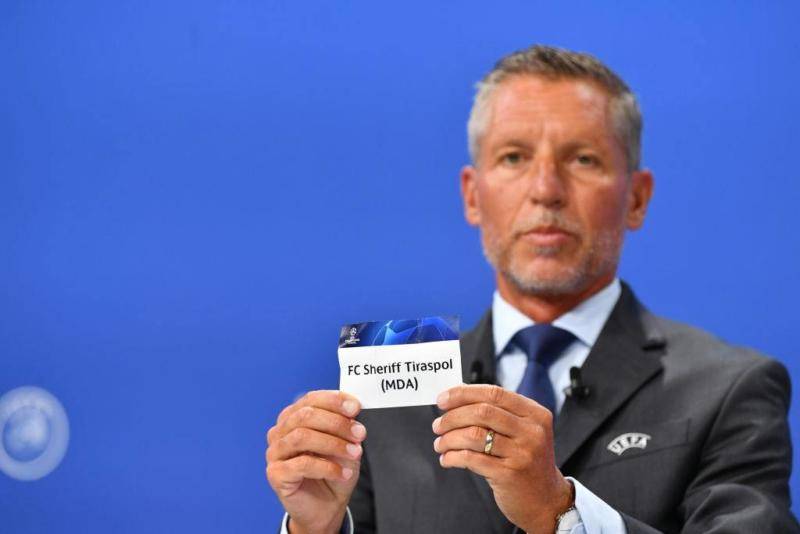
Croatian champions Dinamo Zagreb traveled to the Moldovan city of Tiraspol on August 17th to play their first leg of their Champions League qualifying play-off tie against Sheriff Tiraspol. Widely expected to cakewalk their opponent and setting themselves an advantage going into the second leg at the Maksimir Stadium in a week’s time, Dinamo instead found themselves at the wrong end of a shock result, with Sheriff waltzing their way to a strong 3-0 win. Defend their lead at the fearsome Maksimir and Sheriff will become the first Moldovan side to qualify into the CL group stages.
Founded in 1996 as Tiras Tiraspol, Sheriff has been dominating the Moldovan top-flight since their first league title in 2000/01. In the 21 years since the men in yellow won their first league title, Sheriff has won a staggering 19 league titles, with Dacia Chisinau’s 2010/11 triumph and Milsami Orhei’s 2014/15 league win being the only blimps in the Tiraspol-based side’s dominance.
Much of Sheriff’s success can be accredited to a Victor Gusan, who took over the club in 1997. A former police officer, Victor is a founding employee of the security company Sheriff, a dominating presence within the region of Transnistria where Tiraspol is based. The company’s presence was felt the moment one stepped their feet into Transnistria, with Sheriff owning petrol stations, supermarkets, a TV channel, a publishing house, a construction company, a Mercedes-Benz dealership, an advertising agency, a spirits factory, two bread factories, a mobile phone network, and of course, Sheriff Tiraspol themselves.
Utilizing the wealth that Sheriff (the company) had amassed over the years, Victor pumped funds into Sheriff (the football club) on a yearly basis, allowing them to assemble a squad strong enough to dominate the Moldovan game.
However, despite Sheriff’s relative wealth by Moldovan standards, their entire squad – worth around 11,93 million Euros – still dwarfs Lionel Messi’s salary, with PSG paying the Argentine superstar 35 million Euros per month.
Traditionally, the Moldovan league has been dominated by Zimbru Chisinau since it’s foundation in 1992. As a team based in the Moldovan capital of Chisinau, Zimbru established themselves as an important force in Moldovan football prior to Sheriff announcing themselves in the scene. Taking into account the political tensions between Moldova and the region of Transnistria – which is a breakaway state who had declared their independence from Moldova in 1990 – the rivalry between Zimbru and Sheriff soon exploded into life the moment these two square-off against each other.
Dubbed the “Moldovan El-Clasico,” matches between Zimbru and Sheriff not only represent the clash between the two most successful sides of Moldovan football, but also a sporting clash of ideologies between the people of Moldova (represented by the capital’s finest in Zimbru) and the Transnistria separatists (represented by Sheriff).
Since Moldova is one of Europe’s poorest countries, football clubs within the region came and go in a rapid pace. The region of Transnistria had multiple teams in the past, such as FC Tiraspol, Tiligul-Tiras Tiraspol, Iskra-Stal Ribnita, Dinamo Bender, FC Sucleia, Energhetic Dubasari, Dinamo-Auto Tiraspol, and the nicely-named FC Happy End Camenca to name a few.
However, financial problems more often than not wiped these teams off the face of Moldovan football. Today only Dinamo-Auto represent the region of Transnistria in the Moldovan top-flight alongside Sheriff, while FC Sucleia and a reincarnation of Iskra-Stal known as Iskra Ribnita currently ply their trade in the Moldovan second tier. A rebranded Dinamo Bender, known as FC Tighina, also played in the Moldovan second tier as recently as last season before withdrawing.
With that in consideration, it’s only natural that the people of Transnistria consider Sheriff as “their team,” their premier representation on Moldovan football. Sheriff’s successes represent the successes of the Transnistrians and the men in yellow are more than happy to make their region proud in the European stage.
Dominating the Moldovan football scene meant that Sheriff are regulars in European competitions, but they often fall short in the Champions League qualifying rounds. They have more luck in the Europa League, appearing in the competition’s group stages four times in 2009/10, 2010/11, 2013/14, and 2017/18. Despite failing to escape the group stages in all four occasions, Sheriff were able to test themselves against some of Europe’s finest sides, from Steaua Bucharest to Tottenham Hotspur, Lokomotiv Moscow to Dynamo Kyiv, and Fenerbahce to FC Copenhagen.
In this year’s Champions League, Sheriff had already eliminated Albanian champions Teuta Durres and Armenian champions Alashkert on their way into the third qualifying round. With those two teams around Sheriff’s level, the Moldovans’ first big test came in the form of 1991 European champions Red Star Belgrade. And much to the shock of Europe and the world, Sheriff eliminated the Serbians 2-1 on aggregate, setting up a play-off tie with Dinamo Zagreb – their last hurdle before the group stages.
Having eliminated Tottenham in last season’s Europa League back in March, Dinamo were expected to advance to the group stages at the expense of Sheriff, but the Croats were subjected to a European shock only six months after inflicting one. A brace from Adama Traore – no relation whatsoever to the uber-muscled Wolverhampton Wanderers winger – and a goal from Dimitris Kolovos condemned Dinamo to a 3-0 defeat at Sheriff’s very own Sheriff Stadium, constructed, owned, and operated by both Sheriff the club and Sheriff the company.
Despite their healthy lead, a daunting task still awaits Sheriff – a trip to the fearsome Maksimir Stadium with the terrifying Dinamo ultras surrounding the men in yellow from all corners. The Moldovans must ensure that Dinamo did not beat them by a four-goal margin if they wish to make Transnistria known in the Champions League group stages.
But in football, anything can happen. And Sheriff have one foot set in the promised land that is the Champions League group stages, following in the footsteps of other pioneering underdogs such as Qarabag of Azerbaijan and FC Astana of Kazakstan.

